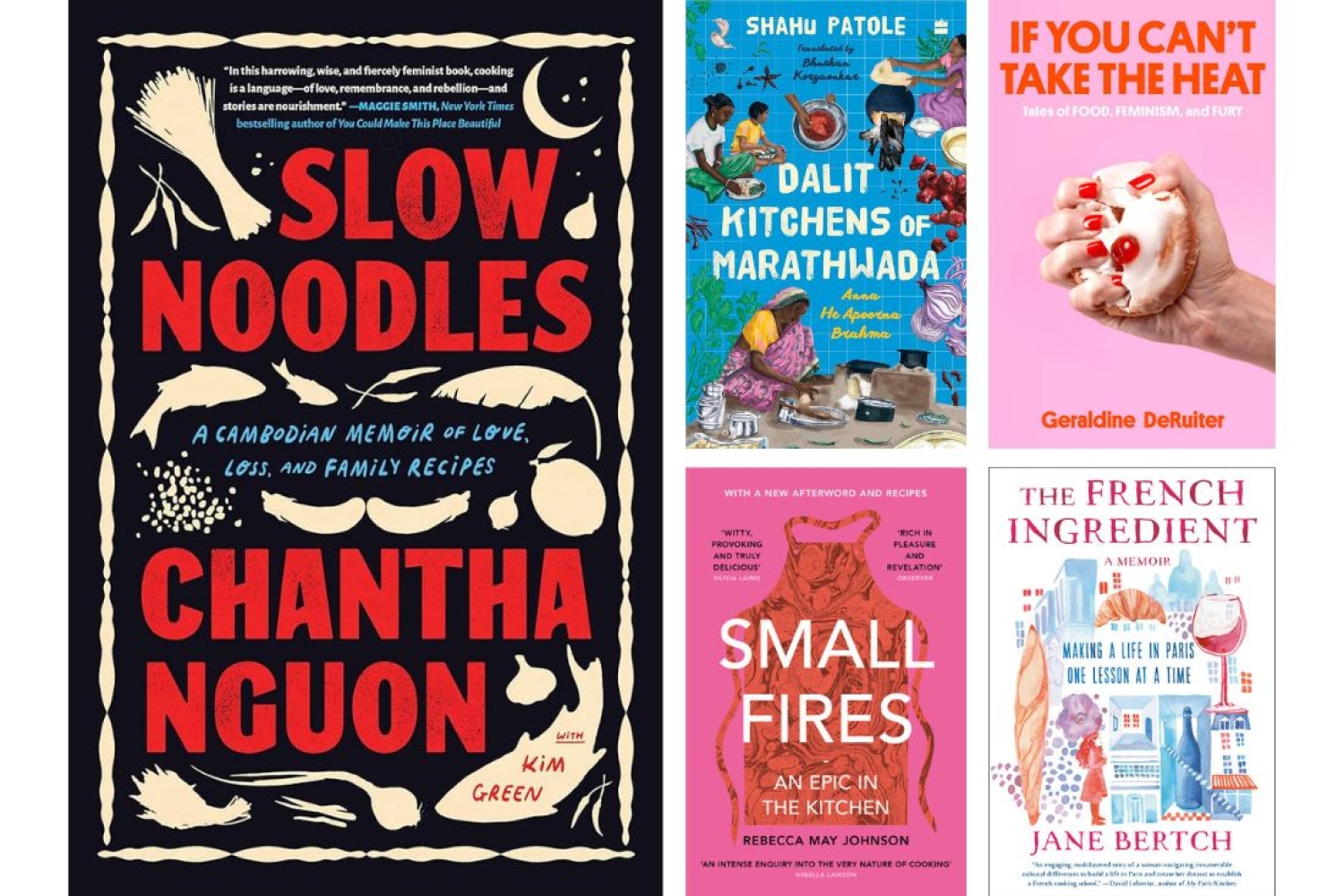

Dive into the world of food memoirs of 2024, where culinary delights meet personal stories in a feast for the senses. These captivating books offer more than just recipes—they serve up rich narratives and unforgettable experiences that connect the art of cooking with the essence of life. From heartfelt family traditions to exotic culinary adventures, each memoir provides a unique perspective on the role food plays in shaping our lives and identities.
Slow Noodles: A Cambodian Memoir of Love, Loss, and Family Recipes by Chantha Nguon and Kim Green
In Slow Noodles, Chantha Nguon shares her poignant journey as a Cambodian refugee who endures the loss of everything—her home, family, and country—while clinging to the cherished tastes and aromas of her mother’s kitchen. Nguon reflects on the tranquil days of 1960s Battambang, her provincial hometown, before the devastation wrought by dictator Pol Pot, who dismantled her nation and claimed over a million lives, including those of ethnic Vietnamese like Nguon and her family. Following the loss of her mother, brothers, and sister in Saigon, Nguon escapes to a refugee camp in Thailand. Over two decades in exile, she finds resilience and survival through a series of endeavors: cooking in a brothel, serving drinks in a nightclub, making and selling street food, working as a suture nurse, and weaving silk.
Dalit Kitchens of Marathwada by Shahu Patole; translated by Bhushan Korgaonkar
Shahu Patole's Anna He Apoorna Brahma was the first book to document Dalit food history through the culinary traditions of two Maharashtrian communities—Mahar and Mang in Marathi. Presented as a memoir interlaced with recipes, it delves into the politics of food in maintaining social divisions and offers a critique of caste-based discrimination, exploring concepts of sattvic (pure), rajasic (fit for a king), and tamasic (sinful) foods. Now translated as Dalit Kitchens of Marathwada, the book unveils a starkly different culinary world, one without the luxury of oil, ghee, or milk, and featuring ingredients largely unknown to the mainstream. It also interrogates Hindu scriptures that prescribe dietary norms for each varna, challenging the notion that one's diet defines their identity. Through a range of dishes, from modest meals to elaborate feasts, the recipes woven into the narrative illustrate food’s transformative role in bridging communities and preserving cultural heritage.
If You Can’t Take the Heat: Tales of Food, Feminism and Fury by Geraldine DeRuiter
When celebrity chef Mario Batali issued an apology for the sexual harassment allegations against him, he surprisingly included a recipe for cinnamon rolls. Geraldine DeRuiter chose to make the recipe, and in doing so, she made her mark on food journalism. In If You Can’t Take the Heat, DeRuiter recounts her unexpectedly true, often hilariously painful (and sometimes just painful) experiences in the culinary world. Through her stories, we discover how she managed to overcome her debilitating anxiety by planning emergency meals for an imagined apocalypse. Deliciously insightful and sharply witty, If You Can’t Take the Heat offers a refreshing perspective on food and feminism from one of the culinary world’s most incisive voices.
Small Fires: An Epic in the Kitchen by Rebecca May Johnson
In Small Fires, Rebecca May Johnson reimagines cooking as a profound act of self-discovery and connection with the world. She portrays cooking not just as a daily task, but as a way of engaging with life—whether it’s the tactile act of donning an apron, the transformative nature of shared meals, or the deeper significance of appetite and physical pleasure. Johnson explores the rebellious spirit of recipes, which defy rigid definitions and control. Small Fires reveals the transformative power of our everyday culinary routines, highlighting how small, persistent acts of cooking can ignite radical change and connection in our lives.
The French Ingredient: Making a Life in Paris One Lesson At a Time by Jane Bertch
When Jane Bertch was seventeen, her mother took her on a graduation trip to Paris. Eager to practice her high school French, Jane was met with dismissive condescension from every waiter and shopkeeper she encountered. By the end of the trip, she vowed never to return. However, a decade later, Jane found herself back in Paris, having been transferred there by the American bank where she worked. Fluent in French and thriving in her new role, she harbored a different ambition: to start a cooking school for foreigners who wanted to learn French cuisine in a welcoming environment and then apply their new skills at home. Jane faced skepticism from the French—questioning why an American banker would open a cooking school in Paris—as well as challenges with real estate and a prolonged effort to attract clients.
Words Platform Desk
Date 21.06.2024